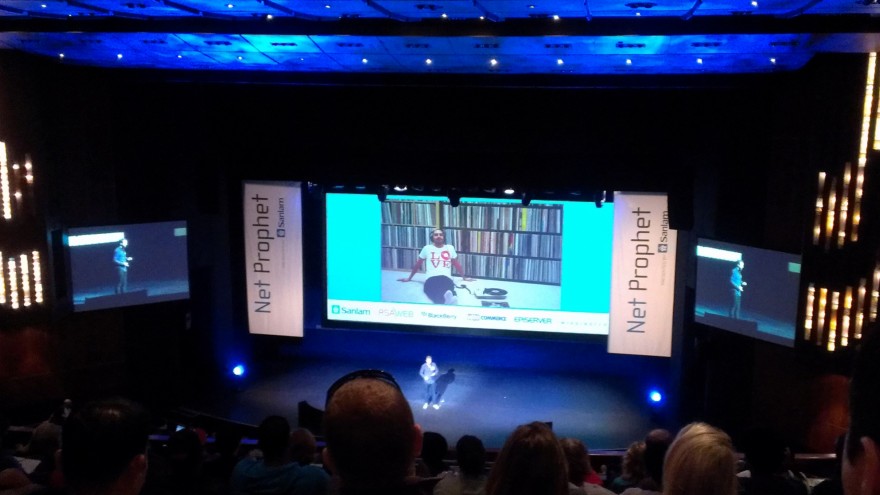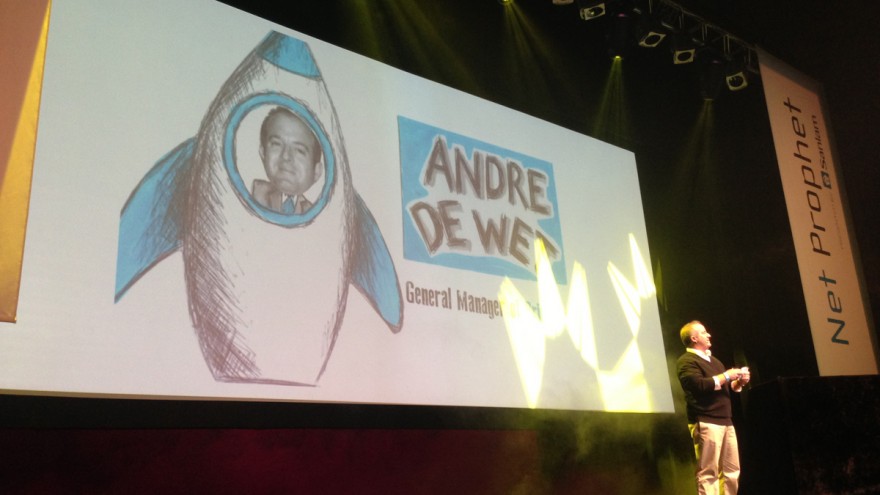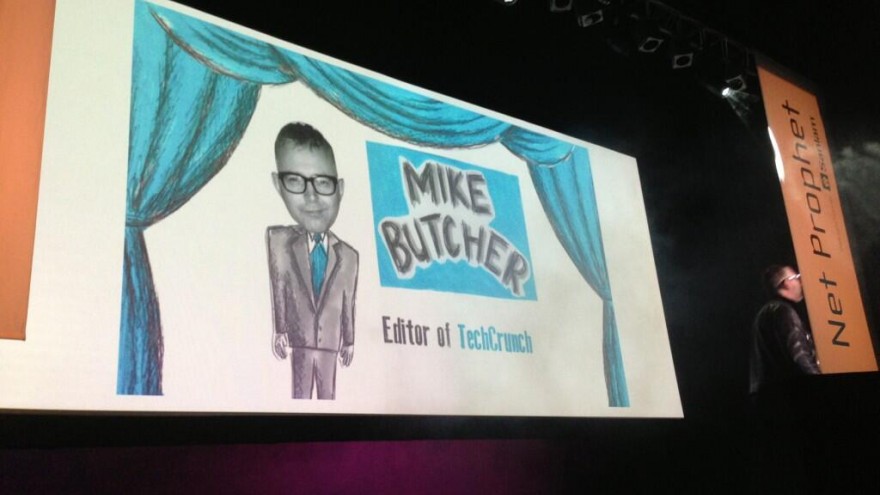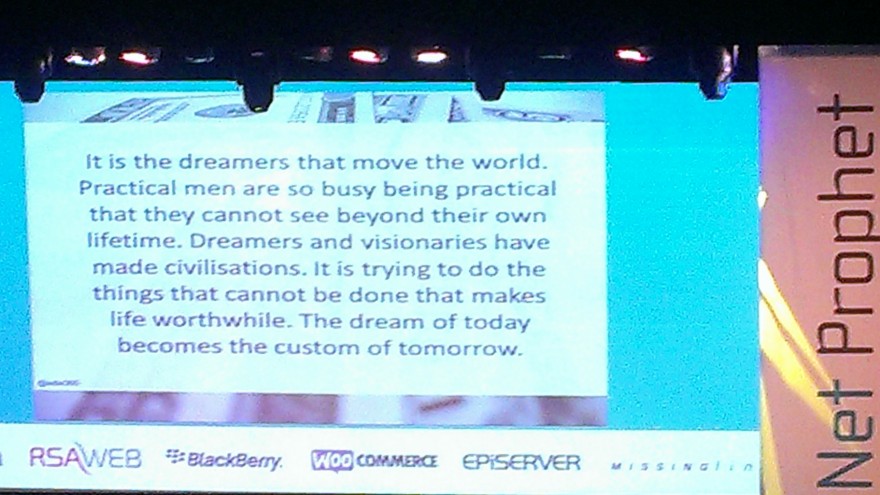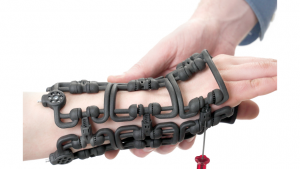Held at Artscape Operahouse in Cape Town on Thursday 23 May, the Net Prophet conference offered delegates insight into all things online, from internet startups and venture capital to online trends and general business acumen. The programme included twelve keynote speakers (the "prophets"), an address by the Western Cape Minister of Finance, Economic Development and Tourism, Alan Winde, two "secret" performances and five PechaKucha-style three-minute talks by less established members of the industry. From what was overall an interesting and insight-rich day, here are some of the highlights.
Erik Jan Bijvank
Speaking on "Tangible things in the digital era", the cofounder of Amsterdam and Cape Town-based agency FONK works with multi-touch technology. He believes that digital by itself is not enough and that multi-touch is helping to make digital tangible. The first steps towards this were the mouse, invented in 1963, and from 2006 multi-touch has taken off with devices like the iPod, smartphones, tablets and now even wearable technology. As Bijvank says, "It's about a symbiosis of digital and tangible: combine the two together and we can create some magic." One notable example that had the audience in stitches was Fundawear, a "Durexperiment" that makes possible remote intimacy via webcam. Is this the future of foreplay? Watch the video below.
Mike Butcher
The editor-at-large at TechCrunch asked the question, "Why haven't we all got Silicon Valley in our backyards?" His answer: We're asking the wrong questions. In a nutshell, Butcher proposes that rather than trying to rebuild Silicon Valley all over the world we should instead be looking to build "Silicon bridges". "Clustering is really important for innovation," he says, and ultimately we'll be stronger if we link our ecosystems. Butcher believes South Africa and the UK are in the prime position to be doing this as we're virtually in the same time zone, speak the same language and have similarities in business culture and scalable markets.
Butcher also touched on what's become something of a conference meme (Seth Godin has said it, Hellicar & Lewis encourage it, FOXP2 veritably promote it) – we should embrace failure.
Without more failure you don't get great startups – Mike Butcher
"You're going to fail so you might as well get used to it," says Butcher. This is based on the stat that 90% of startups fail, but, says Butcher, to survive you've got to keep moving.
Andre de Wet
"It takes 15 years to become an overnight success," said the GM of PriceCheck, winner of International App of the Year in the BlackBerry Achievement Awards 2013. Why 15 years? Because of "the journey you have to go through inside" to succeed in business. It's not an overnight transformation anyone can make. De Wet doesn't mince his words for anyone and was unabashed to admit that for entrepreneurs "there's no such thing as a sold-out sign". Read between the lines. Some key points from his presentation follow:
If you don't like where you are, change it, you're not a tree – Andre de Wet
- An important habit in business is consistency: knock on every door in the street to ensure maximum efficiency. Even for those that don't bite, "every 'no' is a lesson".
- "Money gives you freedom of choice. Wealth buys leisure, not wisdom."
- "Get uncomfortable."
- "Things may come to those who wait, but only those things left by those who hustle."
- "Never mistake the power of influence."
- "A good plan today is better than a perfect plan tomorrow." (So stop wasting time and get it in the market!)
- "Everyone should leave their country at least once for an extended period."
- Investors are looking for three things: 1.) The idea 2.) The team behind it 3.) The answer to how they'll get their money back
- "80% of success is showing up." So make the flight. Take the chance.
Stuart Forrest
The CEO of Triggerfish Animation Studios (Adventures in Zambezia (2012); Khumba (2013)) told the audience "How doing seven ordinary things can lead to one extraordinary result." Read more about his "business tips they taught you in kindergarten" here.
Sylvia Brune
Part of the team of that awesome Cape Town company 88mph that invests in internet startups, Brune's message was simple:
Africa doesn't need more aid. Africa needs more investment.
Even acts of charity like donating clothing can destroy local business, jobs and skills-sharing; celebrities are not the solution(!); and governments should create the framework through which entrepreneurs can solve problems, not solve them themselves.
It's that old story: teach a man to fish...
What the world should rather be doing is nourishing talent, keeping it in Africa and inspiring others to do the same. Because long-term charity is non-sustainable and does nothing to develop a nation's skills, business frameworks or markets. It just teaches people bad habits like dependency and entitlement.
Lonesome Dave Ferguson
Lonesome Dave is a musical legend around Cape Town, named as such for his one-man act creating looping, bluesy tunes that have been warming up local bars, festivals, cafés, nightclubs, rooftops... (you name it, he's played it) for the last six years. Now he can add "conference auditorium" to that list. As prolific as Ferguson is, it was nonetheless a surprise to see him on the Net Prophet stage, dressed in his characteristic head-to-toe black, pointy leather shoes and oversized belt buckle – equipped, as always, with his harmonica and pedals. Ferguson's "secret performance" on the agenda was a welcome one; even more so the fact that he gave his own brand of keynote address between tracks, speaking about the business of branding oneself as an artist and creating a unique product. "If you work on yourself then you've always got your unique product in your back pocket," he said. Judging by the Twitter response the crowd favourite statement was:
Anything is possible if you don't know what can't be done – Dave Ferguson
Bob Skinstad
Ever humble, former Springbok captain Bob "Bobby" Skinstad led with gems like "professional sport is the most mind-numbingly boring vocation you can imagine" as well as a few cracks about rugby players not being the smartest so he wasn't going to "prophesy about the future of the internet". Ironically, Skinstad was far from bring the least smart speaker onstage that day (but that's another article in itself, one better left unwritten). Since retiring from professional rugby, Skinstad has turned his hand to entrepreneurship, opening the Three Toad restaurants in the Cape and heading up Itec, a business solutions and service company, as a shareholder and director.
Skinstad went on to speak about the Pareto principle (not to be mistaken with Pareto optimality), or 80-20 rule, whereby business rule-of-thumb holds that 80% of the objectives are achieved by 20% of the means. So 20% of your product line could be responsible for 80% of your revenue, 20% of your sales team produce 80% of your sales, or 20% of your investment creates 80% of your profit. The key, says Skinstad, is to "concentrate on the 20% that gives you the 80% returns". Using this rule Skinstad has been able to scale down his restaurant menu while increasing profits and decreasing wastage, and put more energy into those staff members that yield the majority of returns, again improving sales with added benefits like higher staff retention.
Skinstad also spoke about the power of belief, illustrating his point with the legend of the four-minute mile (the record that could never be broken, until it was, and then it was subsequently broken twice in the next two months) and the "UPOD" mantra (under promise, over-deliver – as opposed to vice versa).
Ending on an Oprah note, and in reference to speaking about the importance of gratitude, Skinstad showed his gratitude towards the audience by giving every person there a Powerball lotto ticket, with the challenge that if anyone won the R37.8-million jackpot they sponsor the following year's Net Prophet. Thus far, no winner has come forward.
Justin Stanford
Venture capitalist and founder of the 4Di group, Justin Stanford spoke about "VC" in South Africa, saying that there is no real culture of investment in startups in South Africa as it is still seen as a risky business. In the local context, Stanford suggests potential startups need to recognise unique opportunities rather than following international models, because our business climate is so different. There are "massive supply and demand issues between VCs and startups" in South Africa, he says, and a viable business model "can't rely on funding".
That said, what do venture capitalists look for in a potential investment? He listed team and its calibre of character; the ability to target large markets; a business with low-cost overheads; the inclination not to draw large salaries right away; and a belief in what the business is doing.
But before going that route, advises Stanford, "bootstrap as long as you can before applying for funding".
Don Packett
"What do you get if you combine opportunity with a DIY mindset?" asked comedian, raconteur and cofounder of 21 Tanks Don Packett. "People who can do what you can." So what's your unique selling point, and how do you differentiate yourself as a business? The answer, says Packett, is: "We will do it faster." Short, sweet and to the point.
Forget unique, just win, and do it quickly – Don Packett
If you're inspired by what you read here, support the cause and make a donation to the Net Prophet crowd-sourced bursary to help someone less privileged attend university. You can do that here.

